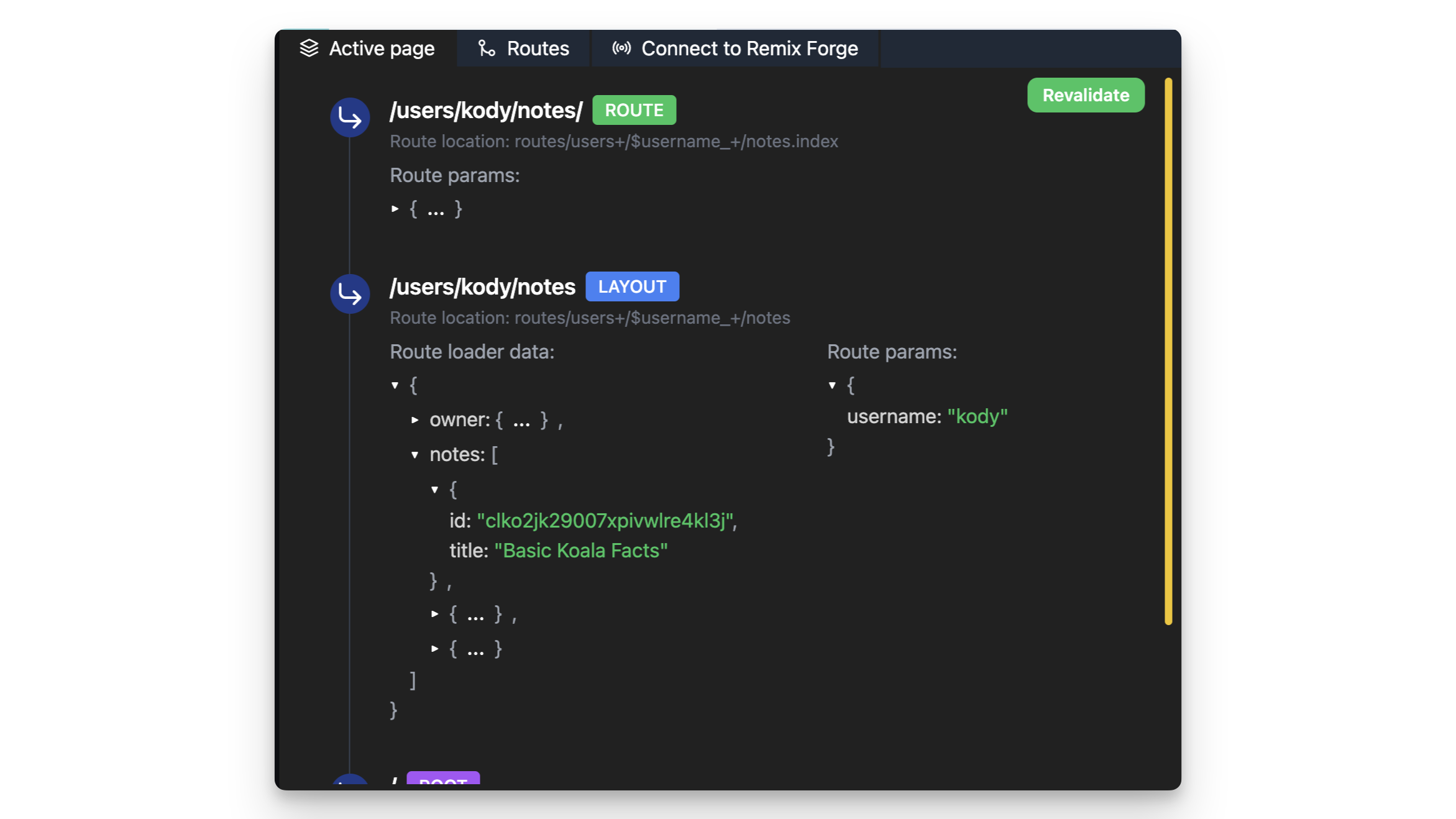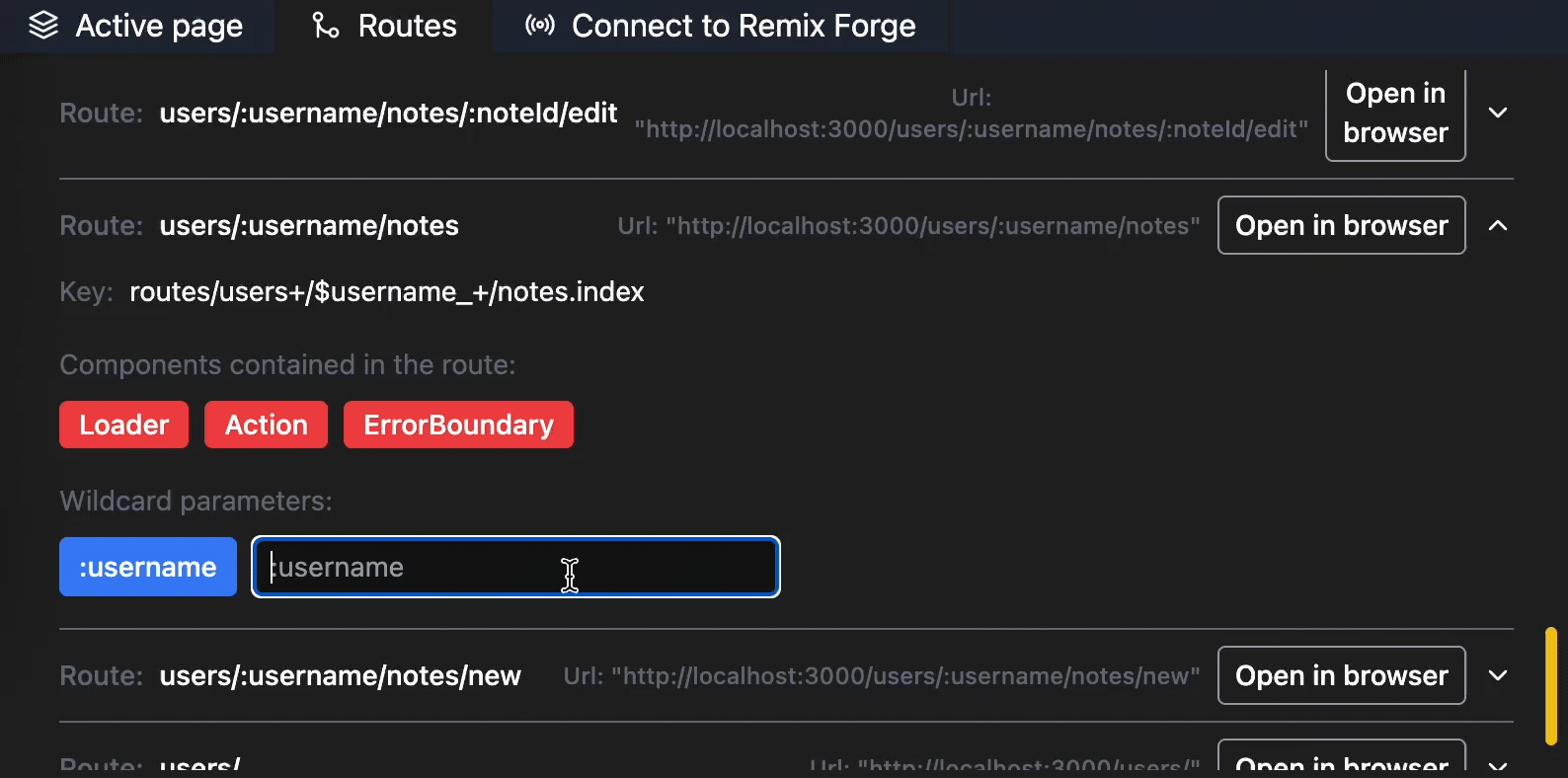Remix Development Tools is an open-source package designed to enhance your development workflow when working with Remix, a full-stack JavaScript framework for building web applications. This package provides a user-friendly interface consisting of three tabs, Active Page, Terminal, Settings and Routes, along with a side tab called Timeline. With Remix Development Tools, you can efficiently monitor and manage various aspects of your Remix projects, including page information, URL parameters, server responses, loader data, routes, and more.
The Active Page tab in Remix Development Tools allows you to gain insights into the current page you are working on. It provides valuable information and data that can assist you in debugging and understanding the behavior of your application.
Key features include:
- URL Parameters: Easily view and analyze the URL parameters associated with the current page.
- Server Responses: Inspect and review the server responses received by the application for the current page.
- Loader Data: Monitor and track the loader data used by the application during page rendering.
- Outlet boundaries Activate the Show Route Boundaries option to see each Outlet and route boundaries by coloring the background. This needs to make a GET request to the current route when the dev tools are mounted for the first time to work properly and hence it is locked behind a flag. You can enable it by passing
showRouteBoundariesprop totruein theRemixDevToolscomponent.
The Routes tab enables you to manage and explore the routes within your Remix project. This tab offers an intuitive interface to perform the following tasks:
- Route Overview: View an organized list of all the routes available in your project.
- Wildcard Values: Add and manage wildcard values for dynamic routing.
- Browser Integration: Open routes directly in your preferred web browser for quick testing and verification.
- VS Code Integration: Seamlessly connect to the Remix Forge VS Code extension and leverage its capabilities to open routes within your VS Code environment and easily add new routes.
The Timeline side tab provides a timeline view of events occurring during the development process. This tab helps you track the sequence of actions and events, providing valuable insights into the execution flow of your application.
The Settings tab allows you to tweak your Remix Development Tools to your needs. Allows you to tweak around the height of the dev tools, the trigger position, the Remix Forge port and many more options to come.
The terminal tab allows you to run terminal commands from the Remix Dev Tools. This is useful for running commands like npm run typecheck or npm run lint:fix without having to switch to the terminal in VS code. The tab requires you to connect to Remix Forge VS Code extension to work properly.
- You can press
Arrow UpandArrow Downto cycle through the history of commands you have run in the terminal. - You can press
Arrow LeftandArrow Rightto cycle through all available commands in your projects package.json file. - You can press
Ctrl + Cto cancel the current command. - You can press
Ctrl + Lto clear the terminal.
To install and utilize Remix Development Tools, follow these steps:
- Install the package via npm:
npm install remix-development-tools -D- Add the following to your application
entry.client.tsxfile:
This might differ if you use <StrictMode> or some other wrappers around <RemixBrowser>, whats important is wrapping the start transition in a callback
-startTransition(() => {
- hydrateRoot(
- document,
- <RemixBrowser />
-);
+});
+ const callback = () => startTransition(() => {
+ hydrateRoot(
+ document,
+ <RemixBrowser />
+ );
+});
+
+ if(process.env.NODE_ENV === "development") {
+ import("remix-development-tools").then(({ initClient }) => {
+ // Add all the dev tools props here into the client
+ initClient();
+ callback();
+ });
+ } else {
+ callback()
+ }- Add the following to your application
entry.server.tsxfile:
The important part is modifying the remixContext, this might differ based on the provider you are using.
function handleBrowserRequest(
request: Request,
responseStatusCode: number,
responseHeaders: Headers,
remixContext: EntryContext
) {
- return new Promise((resolve, reject) => {
+ return new Promise(async (resolve, reject) => {
let shellRendered = false;
+ const context = process.env.NODE_ENV === "development" ? await import("remix-development-tools").then(({ initServer }) => initServer(remixContext)) : remixContext;
const { pipe, abort } = renderToPipeableStream(
<RemixServer
- context={remixContext}
+ context={context}
url={request.url}
abortDelay={ABORT_DELAY}
/>,
{
onShellReady() {
shellRendered = true;
const body = new PassThrough();
responseHeaders.set("Content-Type", "text/html");
resolve(
new Response(body, {
headers: responseHeaders,
status: responseStatusCode,
})
);
pipe(body);
},
onShellError(error: unknown) {
reject(error);
},
onError(error: unknown) {
responseStatusCode = 500;
// Log streaming rendering errors from inside the shell. Don't log
// errors encountered during initial shell rendering since they'll
// reject and get logged in handleDocumentRequest.
if (shellRendered) {
console.error(error);
}
},
}
);
setTimeout(abort, ABORT_DELAY);
});
}- Add the Remix Development Tools to your
root.tsxfile:
+ const RemixDevTools = process.env.NODE_ENV === 'development' ? lazy(() => import("remix-development-tools")) : null
export default function App() {
return (
<html lang="en">
<head>
<meta charSet="utf-8" />
<meta name="viewport" content="width=device-width,initial-scale=1" />
<Meta />
<Links />
</head>
<body>
<Outlet />
<ScrollRestoration />
<Scripts />
<LiveReload />
+ {RemixDevTools ? (<Suspense><RemixDevTools /></Suspense>) : null}
</body>
</html>
);
}- You're good to go!
The RemixDevTools component accepts the following props:
requireUrlFlag: Requires rdt=true to be present in the URL search to open the Remix Development Tools. Defaults tofalse.plugins: Allows you to provide additional tabs (plugins) to the Remix Development Tools. Defaults to[].
Writing plugins for Remix Development Tools is easy. You can write a plugin that adds a new tab to the Remix Development Tools in the following way:
- Create a new file in your project called
remix-dev-tools-plugin.tsx - Implement your jsx component and add the logic you wish to add to the Remix Development Tools.
- Export a function with the following contract:
const MyComponent = () => {
// Implement your logic here
return <div>My Component</div>
}
export function remixDevToolsPlugin(yourOptions?: { ... }): JSX.Element {
return {
// can't be page, terminal or routes, must be unique
id: "my-plugin",
// Name that is shown in the tab next to the icon
name: "My Plugin",
// Icon to be shown in the tab
icon: <MyIcon size={16} />,
// The component to be rendered when the tab is active
component: <MyComponent />,
// Whether the tab requires the Remix Forge VS Code extension to be connected to be shown
requiresForge: false,
// Whether the timeline should be shown on the tab
hideTimeline: false,
}
}- Import it in your
root.tsxfile and pass it to your Remix Development Tools:
import { remixDevToolsPlugin } from "./remix-dev-tools-plugin";
- <RemixDevTools />
+ <RemixDevTools plugins={[remixDevToolsPlugin()]} />
- You should now see your plugin in the Remix Development Tools as a new tab.
If you want to use Remix Forge with your plugin you can do so by setting the requiresForge property to true in your plugin. This will make sure that the plugin is only shown when the Remix Forge VS Code extension is connected.
- Follow the above guide to create a plugin.
- Import the following hook from remix-development-tools:
import { useRemixForgeSocket } from "remix-development-tools"; - Use the hook in your plugin to get the Remix Forge socket:
const MyComponent = () => {
const socket = useRemixForgeSocket();
// Implement your logic here
return <div>My Component</div>
}- You can now use the socket to send messages to the Remix Forge VS Code extension. For now it accepts reading/deleting/opening files in VS Code
const MyComponent = () => {
const socket = useRemixForgeSocket();
const runCommand = () => {
socket.sendJsonMessage({ subtype: "read_file", path: "package.json" })
}
// Implement your logic here
return <div onClick={runCommand}>My Component</div>
}- The following contract is returned from the extension:
interface RemixForgeResponse {
type: "plugin";
subtype: "read_file" | "open_file" | "delete_file" | "write_file";
error: boolean;
data: string | null;
}- Make sure you check if the type and subtype match your needs before using the data.
- Refer to
react-use-websocketfor more information on how to use the socket and what options it accepts because that is what is used under the hood. - After you're done share your plugin with the community by opening a discussion!
The migration should be really simple. These are the following things you need to do:
- Remove the old imports of the stylesheet and addition of the stylesheets to your links export. This is bundled now within the Remix Development Tools.
- import rdtStylesheet from "remix-development-tools/stylesheet.css";
export const links = [
// ... other links
- { rel: "stylesheet", href: rdtStylesheet },
]
- If you were using
initRouteBoundariesClientandinitRouteBoundariesServeryou just need to replace them with the newinitClientandinitServerfunctions. You can skip the rest of the steps, you're ready to go! - Add the
initClientfunction to yourentry.client.tsxfile. This is needed to initialize the route boundaries functionality and possible future functionality. (Refer to getting started steps above on how to do that) - Add the
initServerfunction to yourentry.server.tsxfile. This is needed to initialize the route boundaries functionality (and not cause hydration issues) and possible future functionality. (Refer to getting started steps above on how to do that) - You are good to go!
Make sure you're passing the same context to the i18n.getRouteNamespaces() function as you're passing to the <RemixServer> component.
+ const context =
+ process.env.NODE_ENV === "development"
+ ? await import("remix-development-tools").then(({ initServer }) => initServer(remixContext))
+ : remixContext;
...
- let ns = i18n.getRouteNamespaces(remixContext);
+ let ns = i18n.getRouteNamespaces(context);
...
<I18nextProvider i18n={instance}>
+ <RemixServer abortDelay={ABORT_DELAY} context={context} url={request.url} />
</I18nextProvider>Wrap the RemixDevTools component in a Suspense component.
export default function App() {
return (
<html lang="en">
<head>
<meta charSet="utf-8" />
<meta name="viewport" content="width=device-width,initial-scale=1" />
<Meta />
<Links />
</head>
<body>
<Outlet />
<ScrollRestoration />
<Scripts />
<LiveReload />
+ {RemixDevTools && <Suspense><RemixDevTools /></Suspense>}
</body>
</html>
);
}Contributions to Remix Development Tools are welcome! To contribute, please follow these guidelines:
- Fork the repository and clone it locally.
- Create a new branch for your feature or bug fix.
- Run
npm run devto start the development server with a vanilla Remix app setup. - Run
npm run epic-devto start the development server with the epic stack. - Implement your changes, adhering to the existing code style and best practices.
- Please add tests for any new features or bug fixes.
- Commit and push your changes to your forked repository.
- Open a pull request, providing a clear description of your changes and their purpose.
If you want to contribute to the VS Code extension integration follow the steps above and then:
- Clone the repo for Remix Forge locally.
- Open it in VS Code.
- Run
npm install - Run
npm run dev - Click
F5which will launch a debugger instance of VS Code. - In the debugger instance of VS Code, start the remix dev tools
- Click
Connect to Remix Forgein the Remix Dev Tools - Code on!
If you like Remix Development Tools consider starring the repository. If you have any questions, comments, or suggestions, please feel free to reach out!
Remix Development Tools is open-source software released under the MIT License.
Remix Development Tools was inspired by the Remix framework and aims to enhance the development experience for Remix users.
Feel free to explore Remix Development Tools, and we hope it significantly improves your Remix development process. If you encounter any issues or have suggestions for enhancements, please don't hesitate to open an issue on our GitHub repository. Happy Remixing!
Thanks to all the contributors on this project and the support to the community. You guys are awesome!
Devoted to my loving wife.
In loving memory of my late Grandfather, who taught me to always be curious, never stop learning, and to always be kind to others. I miss you, Grandpa.







